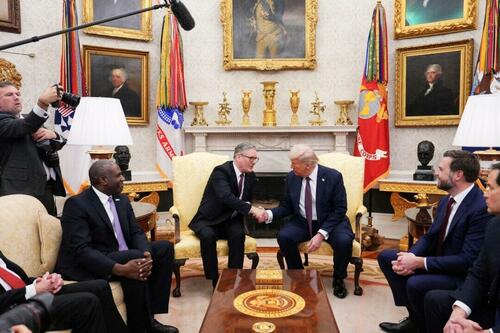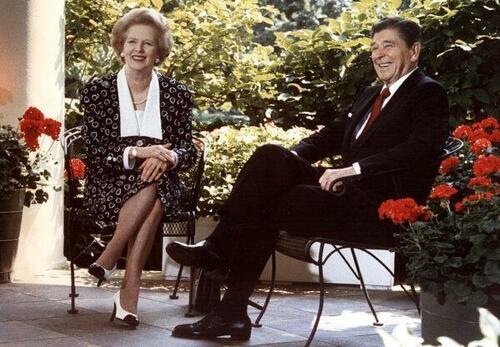Trump’s Reconfiguration Of Global Conflict: What It Means For Asia And Europe
Authored by Joseph Yizheng Lian via The Epoch Times,
Two months into his second term, President Donald Trump was accused by some politicians in the West of abandoning Washington’s longstanding allies as a result of his stance on the war in Ukraine. But one doesn’t have to look very far back in history to note that a similar act of “unfriending” had occurred from continental Europe and wasn’t unjustified.
In 1988, the late British Prime Minister Lady Margaret Thatcher, speaking at the College of Europe in Bruges, Belgium, advised her audience thus:
“We must strive to maintain the United States’ commitment to Europe’s defence. And that means recognising the burden on their resources of the world role they undertake and their point that their allies should bear the full part of the defence of freedom, particularly as Europe grows wealthier.”
Unfortunately, those mild words of the Iron Lady fell on deaf ears.
Eleven years later, her tone had changed into one of disdain and spite, when in a Conservative Party conference in Blackpool she shockingly declared, “In my lifetime all the problems have come from mainland Europe, and all the solutions have come from the English-speaking nations across the world.”
Between Bruges and Blackpool, Thatcher morphed from a 30-year supporter of European integration into a fierce opponent.
She decried the “British malaise”—a term used by Conservative politician and historian Sir Ian Gilmour in his 1969 book “The Body Politic”—to characterize the economic stagnation, the social decline, and the sense of futility and hopelessness that seemed to pervade British society.
Thatcher abhorred the European welfare state, criticized intransigent unionism, and loathed the power wielded by unelected Brussels bureaucrats, who had virtually forgotten NATO by the mid-1990s, even though Europe had grown rich. She won her battle posthumously, in 2020 (BREXIT).
U.S. President Ronald Reagan and British Prime Minister Margaret Thatcher pose for photographers on the patio outside the Oval Office in Washington on July 17, 1987. Mike Sargent/AFP via Getty Images
Since then, primarily by default, Britain has gone out of Europe and built partnerships in the Indo–Pacific, a region that it is historically familiar with, signed bilateral free trade agreements Japan, South Korea, Australia, New Zealand, and is in talks for new ones with the United States and India. The UK has recently gained membership in the Comprehensive and Progressive Agreement for Trans-Pacific Partnership, or CPTPP. The new Labour government has not tried to bend back the arc.
The United States is on a similar trajectory. Trump also spurns Big Government and bureaucratic multinational agencies. Like Thatcher almost 40 years ago—but much more vehemently—he has criticized other NATO countries for spending far too little on defense—a constant gripe of U.S. presidents, especially Dwight Eisenhower and Ronald Reagan.
Trump’s associates readily criticized certain European countries for abandoning basic Western values, such as adopting free speech, abolishing secure national borders, and letting in gangsters and fanatical Jihadis who unleash terrorist attacks on innocent citizens. Trump also thinks all these are happening in the United States.
The Russia–Ukraine war has caused rifts between Trump and other NATO members. He wants the war to end so that Washington can “pivot” to the Indo–Pacific to squarely face the “pacing threat” of communist China, which he, since his first term, has rightly regarded as America’s major adversary.
So, almost simultaneously, the two major English-speaking countries, the United States and the UK, are extricating themselves from entanglements in Europe and reaching out to Asia. Their “leaving Europe to enter Asia” is going full circle from the time when Japan’s most famous 19th century reformist, Fukuzawa Yukichi, advocated the opposite, “leaving Asia to enter Europe” (1885), under very different circumstances.
If U.S. Commodore Matthew Perry’s arrival in Tokugawa Japan in 1853 and World War II marked the first and second historic coming of America to Asia, respectively, then the “Trump pivot” may well be the third. It could add enormously to the prosperity in Indo–Pacific Ex-China, for two reasons. First, as the U.S.–China decoupling continues, much American money leaving China will go into other Indo–Pacific economies. Second, when greater American military might, coupled with increased defense spending and capabilities in East Asian countries, is realized under Trump’s pressures, it will be deployed to contain the Chinese regime and achieve greater regional stability, and new investment money will arrive with more confidence.
But then what about Europe, which the United States and perhaps Britain are leaving behind? It will do fine, but in a previously unexpected way.
This will be the scenario: Trump 2.0 will continue to goad Europe to pony up for its own defense, necessarily at the expense of its welfare state, climate policy, and open borders, and damage the transatlantic relationship if it must. Trump will be much maligned in the process.
For example, a recent BBC article accused the U.S. president of “blow[ing] up the world order.”
But that is sheer Eurocentrism, because Trump is merely resetting Washington’s relationship with Europe and Europe is not the whole world.
In fact, there are good signs that Europe is reacting to Trump in a healthy way; for example, the newly elected German leader has decided that Germany must spend huge amounts in upgrading its military, notwithstanding that it necessarily will have to cut welfare spending and retune its growth model.
Expectedly, when Europe is strong and wholesome again, Trump will be gone from the stage and his successors will be able to mend fences with all obstacles removed. At that point, the world will still be essentially bipolar: the open society camp versus the authoritarian-or-worse camp.
There will be two main theaters where the conflict between the two camps will be played out.
First is Asia, in which the United States—rid of its European baggage and in some kind of alliance with Japan, Taiwan, South Korea, and Australia—will face off against the Chinese regime.
The mightiest power on Earth will try to roll back and contain the most dangerous.
Next is Europe, where a reformed and repowered European Union will take on Russia.
A second-rate power will try to keep a third-rate one in check.
It will be a much more rational conflict configuration and manageable division of labor for the West than it is now.
Views expressed in this article are opinions of the author and do not necessarily reflect the views of The Epoch Times or ZeroHedge.
Tyler Durden Wed, 04/02/2025 – 22:35
Source: https://freedombunker.com/2025/04/02/trumps-reconfiguration-of-global-conflict-what-it-means-for-asia-and-europe/
Anyone can join.
Anyone can contribute.
Anyone can become informed about their world.
"United We Stand" Click Here To Create Your Personal Citizen Journalist Account Today, Be Sure To Invite Your Friends.
Before It’s News® is a community of individuals who report on what’s going on around them, from all around the world. Anyone can join. Anyone can contribute. Anyone can become informed about their world. "United We Stand" Click Here To Create Your Personal Citizen Journalist Account Today, Be Sure To Invite Your Friends.
LION'S MANE PRODUCT
Try Our Lion’s Mane WHOLE MIND Nootropic Blend 60 Capsules
Mushrooms are having a moment. One fabulous fungus in particular, lion’s mane, may help improve memory, depression and anxiety symptoms. They are also an excellent source of nutrients that show promise as a therapy for dementia, and other neurodegenerative diseases. If you’re living with anxiety or depression, you may be curious about all the therapy options out there — including the natural ones.Our Lion’s Mane WHOLE MIND Nootropic Blend has been formulated to utilize the potency of Lion’s mane but also include the benefits of four other Highly Beneficial Mushrooms. Synergistically, they work together to Build your health through improving cognitive function and immunity regardless of your age. Our Nootropic not only improves your Cognitive Function and Activates your Immune System, but it benefits growth of Essential Gut Flora, further enhancing your Vitality.
Our Formula includes: Lion’s Mane Mushrooms which Increase Brain Power through nerve growth, lessen anxiety, reduce depression, and improve concentration. Its an excellent adaptogen, promotes sleep and improves immunity. Shiitake Mushrooms which Fight cancer cells and infectious disease, boost the immune system, promotes brain function, and serves as a source of B vitamins. Maitake Mushrooms which regulate blood sugar levels of diabetics, reduce hypertension and boosts the immune system. Reishi Mushrooms which Fight inflammation, liver disease, fatigue, tumor growth and cancer. They Improve skin disorders and soothes digestive problems, stomach ulcers and leaky gut syndrome. Chaga Mushrooms which have anti-aging effects, boost immune function, improve stamina and athletic performance, even act as a natural aphrodisiac, fighting diabetes and improving liver function. Try Our Lion’s Mane WHOLE MIND Nootropic Blend 60 Capsules Today. Be 100% Satisfied or Receive a Full Money Back Guarantee. Order Yours Today by Following This Link.








